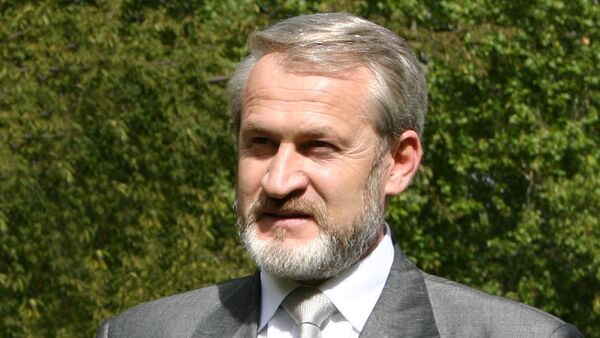The detention of Akhmed Zakayev, an "emissary of the Chechen government in exile," in Poland turned out to be merely a minor provocation: the Warsaw district court refused to approve his arrest. The "culture minister" of the non-existent Ichkerian government has left for Britain, so he can return to Poland but this time with a new visa.
Akhmed Zakayev, who Moscow considers a terrorist, was granted political asylum by Britain in 2003. He faces charges of murder, kidnapping and terrorism in Russia, dating back to the 1999 conflict in Chechnya.
Zakayev is exploiting this scandal to remind the world that he exists. He has given interviews to Polish newspapers, in which he expresses his surprise at being detained. "It hadn't crossed our minds that the Poles, who have always supported us, would turn their backs on us," he said in an interview with the daily newspaper Rzeczpospolita.
The self-appointed diplomat is not being entirely honest. He was perfectly well aware that he could be arrested if he went to Poland for the World Congress of Chechen People. He had been warned by certain individuals as well as by the Polish press, the possibility had even been raised in the country's main newspaper, Gazeta Wyborcza. Many of the experts it cited said it would be best if he did not come to Poland, but he ignored their warnings and went anyway.
Why? He probably knew that, given the current political climate in Poland, he would unlikely be extradited to Russia. Poland today is split into two camps: the liberals led by President Bronislaw Komorowski and Prime Minister Donald Tusk, and their opponents rallying behind Jaroslaw Kaczynski's nationalist party Law and Justice (PiS).
These two political groups may be opposed but both are terrified of being thought to be soft on Moscow. Kaczynski's supporters, who lost the recent presidential elections, are searching for signs of Russophilia in the party in power.
Given that context, extraditing Zakayev to Russia would have meant provoking a deluge of accusations from Kaczynski's party. When Zakayev was detained (something the Polish authorities had to do because of an Interpol-issued international arrest warrant), the PiS leaders caused a scene, saying "the Russian prosecutor's office rules the roost in Poland."
This is why, once Zakayev had been detained, Prime Minister Tusk and Foreign Minister Radoslaw Sikorski hastened to say they were not to blame, that the Polish prosecutor's office is independent of the executive authorities.
Zakayev and other organizers of the congress of Chechens who want to see the region become independent from Moscow knew that for them it was a win-win scenario, possibly thanks to people inside Poland's "independent" prosecutor's office and court system. Both Zakayev's lightning-speed detention, even before he had arrived in the Warsaw prosecutor's office, and his equally fast release following a decision by an "independent" Polish court, seem highly peculiar.
Who did he want to provoke? Not the Polish authorities, that's for sure.
Having learnt of Zakayev's arrest, Russia, acting in accordance with its request to Interpol, was bound to demand his extradition, which was an impossible request. Had the Kremlin officials lost their nerve and spoken off-guard about Warsaw's little game, newspapers world over would have led the next day with news that Moscow is once again treating Poland like its province.
The Zakayev card had long been all played out, and he is not a person of great significance. After Ramzan Kadyrov came to power in Chechnya, the Maskhdov and Basayev-led "Ichkerian government in exile" (in which at one point Shamil Basayev had been "prime minister" under "President" Aslan Maskhadov) lost what influence it had in the republic.
This "government in exile" poses no threat to Moscow or Grozny, which means that they no one really needs Zakayev to be extradited.
During the first Chechen war (December 1994 to August 1996), like many others, Zakayev committed crimes, but nothing by comparison with the body count racked up by such hardened criminals as Shamil Basayev, Zelimkhan Yandarbiyev or Salman Raduyev. Zakayev was essentially a somewhat dim, rather minor agitator, with a very loud voice.
Although he represents no one, he has spent years as the Western press' pet analyst, commenting on terrorist attacks carried out by illegal armed groups, although any reasonable person can see that his versions of events are less than convincing.
For example, Zakayev gave an interview to the BBC during the Nord-Ost tragedy, which took place on October 23, 2002 at the Dubrovka theater in Moscow that this terrible crime was organized by the Russians themselves to frame Maskhadov.
Last weekend he repeated his tired old conspiracy theories in an interview with Rzeczpospolita. Does the man have no new ideas?
Moscow has so far, thankfully, not risen to his bait, which is good, for it would be unwise to let Zakayev ruin the recently improved Russian-Polish relations. By refusing to denounce the organizers of the Dubrovka terrorist attack in Moscow and the Beslan school hostage crisis in North Ossetia of September 1, 2004, the "Ichkerian government in exile" has destroyed its legitimacy and lost any respect it may once have commanded in the world.
It is unclear who finances that government's emissaries, including Zakayev, but his latest "courageous act" in Poland could be an attempt to squeeze more money from their sponsors.
Zakayev's arrest and immediate release, as well as the fact that he was issued with a new Polish visa, were blows to the prestige of the Polish rather than Russian prosecutor's office, to the Polish courts, to Poland's government and parliament, some members of Kaczynski's party even hurried to visit Zakayev in his "detention."
If the Polish government doesn't care about its international reputation, it should feel free to continue in the same spirit. It's not worth Russia dirtying its hands by getting involved.
RIA Novosti commentator Dmitry Babich
The opinions expressed in this article are the author's and do not necessarily represent those of RIA Novosti.



